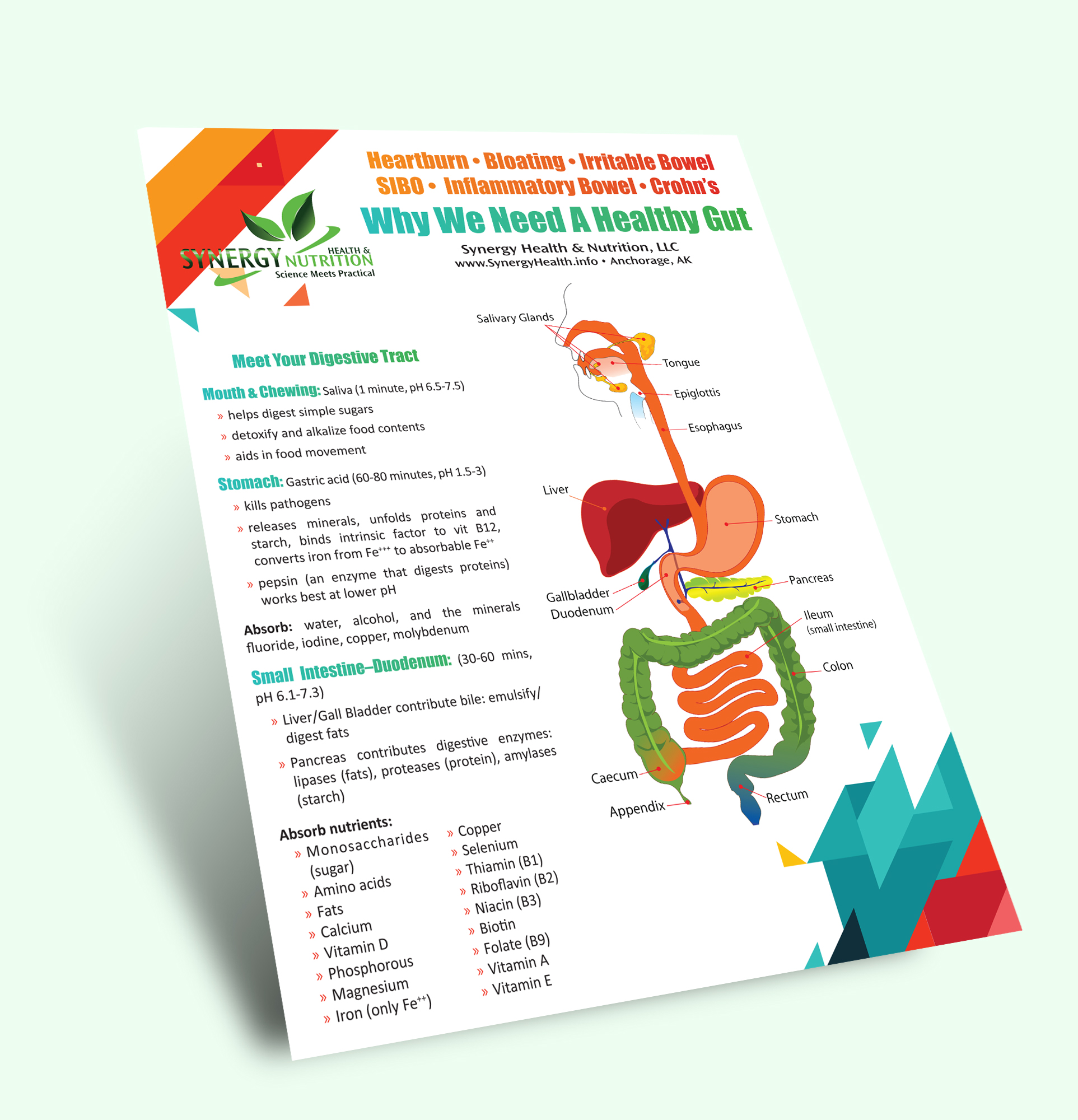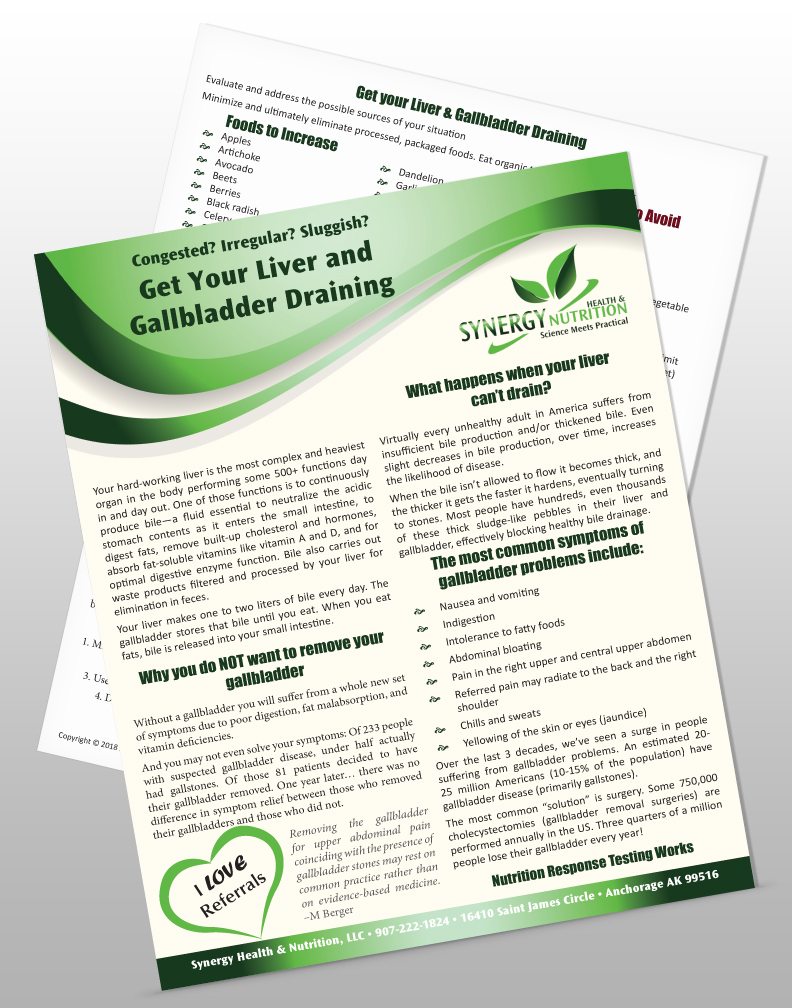 Digestive enzymes in your gut…
Digestive enzymes in your gut…
…liberate and absorb nutrients from your food, yet somehow keep toxic chemicals moving through, and out.
…kill unwanted bacteria, parasites, yeast… even viruses, yet maintain trillions of helpful bacteria and even helpful yeast—imagine that, helpful yeast!
Restoring and then maintaining a healthy digestive tract is one of the most important things you can do for your health.
Digestion is a sophisticated symphony
Our busy lifestyles ignore our bodies’ specific rhythms and harmonies that form vital patterns for digestion. We need to sit down and enjoy, take our time and just look at our meal—those visual cues help the brain start preparing the body to receive the food. The pleasant aroma of your favorite (or any) dish starts the flow of saliva and the first in a series of digestive enzymes and digestive steps.
Your body doesn’t absorb food; it absorbs nutrients. Food like wild salmon and broccoli has to be broken down into its nutrients: proteins, fats, sugars, vitamins & minerals. Digestive enzymes break the food down into nutrients.
Chew: the first enzymes are made in your mouth and begin the process of releasing nutrients. Some enzymes help protect you from bacteria and support the body’s immune system.
Swallow: your stomach acid—continues to break down food and release its nutrients. That it is sufficiently acidic is or you won’t absorb vitamin B12 and minerals like magnesium and calcium.
Digest: a healthy pancreas delivers about 8 cups of pancreatic juice into the upper intestine, daily; a healthy liver contributes about 4 cups of bile, stored in your gallbladder. When you eat, chew, and swallow… your nervous system is already telling your organs to release these enzyme-filled fluids into your small intestine.
Absorb: the entire orchestra continues to break down food and release nutrients. The fuel nutrients (proteins, carbohydrates, and fats) plus most vitamins and minerals are absorbed along the 25-foot length of your small intestine.
Eliminate: your liver sends waste out of your body by releasing it into the small intestine with bile. Imagine that: the same section of your body that absorbs vital nutrients doesn’t reabsorb toxic waste, as long as it’s healthy. It also doesn’t allow bacteria, parasites, yeast overgrowth… to run amok… if it’s healthy.
But most of us have created different priorities. We eat on the run, stressed, and have forgotten that each meal is an event; a time to connect with our friends and family.
And… we stagnate and congest and play out of tune.
Digestive enzymes: Your key players
Optimal digestive health, and your health, depends on the interaction between digestive enzymes and the food you eat every day.
Enzymes: a protein that drives a chemical reaction.
The blogospere and the incomparable Dr. Google will gladly tell you that digestive enzyme production by your body declines as you age. Question: Did anybody take a minute to explain why? Hmmm…probably not.
Knowing why enzymes might decline, and what you can do about that, is important to your health. Approximately 10-15% of people in the United States report some type of symptom associated with functional digestive health: heartburn, bloating, food just “sitting there” not digesting, gas, constipation…
When food is not properly digested, one experiences a variety of unwanted “sensations” like gas, bloating, indigestion, heartburn. You might see undigested food in your stools, your poop might come too often or not often enough… even if you are eating right.
As a finely-tuned clinical expert, these symptoms often tell me exactly what is happening and where we need to start your healing program.
Before we even consider digestive enzyme supplementation, we must get a clear understanding of the events which can lead up to needing them. In more cases than not… start here:
Stress stops your body from making digestive enzymes
Your body will not digest food when it is stressed.
When we are in a hurry or stressed, our body gears up to fight or flee—the exact opposite of rest and digest. Even though we may be eating well, we aren’t breaking down our food and absorbing all its vital nutrients. Our modern, on-the-go era has resulted in our decline of digestive function.
Chew: Not taking time to adequately chew reduces the time food interacts with saliva. This first step in the digestive process requires pause. Be willing to slow down. The rest of the steps in digestion work better when you relax and chew.
Stomach: Heartburn? Stress diverts blood away from the gut to feed the muscles and the brain so the body can run away or fight to survive a perceived threat. When this happens, the stomach produces LESS acid—not too much acid.
Here’s the scoop…
- Stress leads to decreased blood flow to digestive system including the stomach…
- Stress reduces stomach acid production; it lowers HCl…
- Enough HCL is one of the signals to close the lower esophageal sphincter—the muscle preventing food to reflux into the esophagus…
- So the stomach stays open…
- …food doesn’t digest well…
- …the stomach contents can belch, burp, or reflux back into the esophagus.
- The acid stomach contents in the wrong place cause heart burn.
Processed food needs even more enzymes
Sadly, more than half (57%) of the calories consumed in America are from ultra-processed foods—these foods also delivered 89% of the added sugar in our diet.
Just imagine: two categories of processed foods!
- Ultra-processed foods that are really bad and toxic.
- And, run of the mill, garden variety processed foods, many of which have “healthy” on their label.
Ultra-processed foods have many additives for flavor, fillers or thickening agents for inexpensive bulk, preservatives for shelf life or chemicals to make us crave them. It’s true, chemicals are often added to make us crave more processed foods. Most of us easily recognize and avoid this junk.
And then there are the garden-variety processed foods pre-made to be more convenient. But they don’t taste very good or have much shelf life without:
- Sugar or artificial sweeteners: Please read the ingredients list!
- Refined, cooked oils. (Anything baked with oils or fried, i.e., bread, baked goods, chips, etc.)
- Chemicals: Don’t eat it if you don’t recognize the name in the ingredients.
If it needs a wrapper and a nutrition label, it is processed!
Of course, the ones labeled “healthy” may also be “made with organic” and have turbinado sugar—but they are still processed.
Starting in the mouth, these foods need to be chewed more, your stomach needs to work harder, and your small and large intestine need more resources to extract any remaining nutrients.
Do YOU need more digestive enzymes?
That depends.
First of all, you should not buy digestive enzymes “just because” and especially not from fear that enzymes decrease during aging.
Intestinal irritation from a diet of processed food, food pesticides, environmental pollutants, and stress all disturb your delicate balance of liver, gallbladder, bile, pancreatic enzymes and gut microbes.
A congested liver creates “sludgy” bile which coats the gallbladder, bile, and pancreatic ducts—you may get gallstones. If your bile is “sludgy”, enzymes may not be reaching the small intestine where they should be going to work releasing nutrients from your food.
Let’s fix that first.
How to optimize your digestion?
Nearly 74% of Americans are experiencing some form of digestive distress. With optimal digestion being the driver of a healthy immune system, balanced moods, steady energy, stable blood sugar, and strong vitality, this is disturbing!
Before you:
- Stop eating gluten
- Stop eating dairy
- Stop eating big lunches because they make you sleepy
- Become a Vegan or Raw Foodist
- Start eating Paleo
- Start eating six small meals a day
Please eat mindfully. Take time to enjoy your meals!
Your digestive friends:

After that, here are the important shifts:
Step 1: Replace the processed flours (even gluten free) and sugars with more bile-movers such as raw beets, celery, apples, artichokes and leafy greens. Greens should make up 2/3 of your plate—5-9 servings per day. Fibers in greens attach to toxic waste and escort it through, and out. Grab my handout here.
Step 2a: Drink Fenugreek tea. It acts as a lubricant for the bile ducts and helps support normal bile flow.
Step 2b: Drink Green tea. Green tea (Camillia sinensis) restores balance to the healthy bacteria living in your gut while restoring gut function.
Step 3: Add cinnamon to your day meal. Cinnamon tastes naturally sweet, supports healthy blood sugar levels while supporting normal bile flow.
Step 4: Mix 1-2 tbsp of organic olive oil with 1-2 tsp of lemon juice. Shake and drink every morning OR night on an empty stomach for 1 month. This will exercise the liver and gallbladder, while supporting healthy bile flow in the bile and pancreatic ducts.
Step 5: Come see me for a Nutrition Response Testing exam. I’ve seen more than my share of “cleansing casualties” and “healthy eaters” with distended and bloated abdomens—a telltale sign that their gut is congested and compromised—some of whom are nutritionists! You can become dependent on digestive enzymes, so let’s make sure you need them. Let’s stop guessing and get you only the ones you need.
Next week we look at the importance of the plant kingdom. Yours in health!
Oshima T, Miwa H. Epidemiology of Functional Gastrointestinal Disorders in Japan and in the World. Journal of Neurogastroenterology and Motility. 2015;21(3):320-39. doi:10.5056/jnm14165.
Van der Laan, LN, de Ridder DT, Viergever MA, Smeets PA. The first taste is always with the eyes: A meta-analysis on the neural correlates of processing visual food cues. Neuroimage. 2011;55(1):296-303
Mattes, RD. Physiologic Responses to Sensory Stimulation by Food: Nutritional Implications. Journal of the American Dietetic Association. 1997;97(4):406-10.
Tiwari M. Science behind human saliva. Journal of Natural Science, Biology, and Medicine. 2011;2(1):53-8. doi:10.4103/0976-9668.82322.jj
Mego M, Accarino A, Malagelada JR, et al. Accumulative effect of food residues on intestinal gas production. Neurogastroenterol Motil. 2015; 27(11):1621-8.
Smith CH, Boland B, Daureeawoo Y, et al. Effect of aging on stimulated salivary flow in adults. J Am Geriatr Soc. 2013; 61(5):805-8.
Laugier R, Bernard JP, Berthezene P, Dupuy P. Changes in pancreatic exocrine secretion with age: pancreatic exocrine secretion does decrease in the elderly. Digestion. 1991;50:202–11.


Leave a Reply
You must be logged in to post a comment.